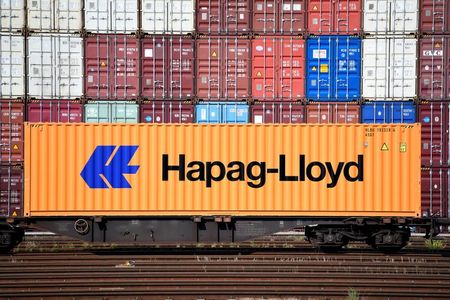Hapag-Lloyd chief warns of ‘rougher seas ahead’ for container shipping

Hapag-Lloyd’s chief executive warned of “rough seas ahead,” as a combination of tumbling freight rates and a slump in demand pummels major container shipping groups’ bottom lines.
Speaking to reporters on a conference call this morning, Rolf Habben Jansen said it is a “challenging market environment” amid “weak” demand for container transport over the last year.
Freight rates, he said, have come down to a level which is “too low”, coinciding with a rise in costs at container shipping lines, while a slew of new ships entering the market eats into the massive piles of cash built up by the sector as global lockdowns were lifted.
Habben Jansen’s tepid outlook marks a major downturn from the highs of recent years, when the container shipping sector went through an unprecedented boom, notching in more profit during the three years from 2020 than in the previous six decades combined.
But demand has slumped over the last year and freight rates have tumbled back to pre-pandemic levels, while fears grow over the huge oversupply of vessels ordered during the pandemic boom.
Hapag-Lloyd saw its half year profits fall by more than half last month, while Maersk warned of a “radically changed business environment” as profits plunged in May.
Climate regulations from the International Maritime Organisation (IMO) have further influenced oversupply, prompting carriers to invest in new green fleets in order to meet looming decarbonisation targets.
Container shipping companies have increasingly resorted to scrapping vessels as they struggle to manage the costs associated with a slew of new pandemic-era orders entering the market.
Habben Jansen warned there were “a lot of ships” still entering the global fleet while noting that vessel scrapping was “certainly not getting cheaper these days”.
“When we look at the order book, and new ships coming in, we see that the order book is still fairly high. And we see of course, a lot of scheduled deliveries for the remainder of this year and also for 2024,” he said.
Asked how long freight rates would remain lower, Habben Jansen said “that’s probably the most difficult thing to predict in this industry,” but noted “pressure” on rates would remain should the current supply and demand climate continue.
“And, of course, that has a considerable impact on the bottom line,” he added.